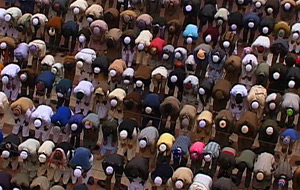The following is an excerpt from The Jakarta Globe. For the full article, follow the link at the end of the page.
Despite living under the same roof for years, Fachri (not his real name) thought his father had no clue that he was gay. But around five years ago, when he borrowed his father’s Koran to research a project, he was surprised to find certain verses underlined in pencil.
They were about God’s wrath toward people who committed acts of sexual deviance during the time of Prophet Luth (or Lot), the Islamic equivalent of the Sodom and Gomorrah text in the Bible.
Growing up in a religious family that adheres to Islamic teachings, it was not the first time Fachri had come across the verses. It was sort of touching, he said, how his father seemed to want to know him better, although he wished it was not through the religious text he despised.
“The text was one of the reasons why I decided to renounce my religion. I have lost faith in any kind of religion because it excludes us, condemns us,” said the 31-year-old advertising executive. “It creates an absolute border, whereas a human being is a complex thing.
“Why should I embrace religion when it doesn’t accept us? Why should I adhere to Islam, or any religion for that matter, when there is no space for me?”
In Indonesia, where religion plays a dominant role in society and where 90 percent of the population is Muslim, homosexuality is not punishable by law but condemnation of homosexuality has been voiced by many religious leaders, not only Islamic.

Muslims praying in a mosque.
A scene from A Jihad for Love, an
award-winning documentary about gay Muslims.
Despite living under the same roof for years, Fachri (not his real name) thought his father had no clue that he was gay. But around five years ago, when he borrowed his father’s Koran to research a project, he was surprised to find certain verses underlined in pencil.
They were about God’s wrath toward people who committed acts of sexual deviance during the time of Prophet Luth (or Lot), the Islamic equivalent of the Sodom and Gomorrah text in the Bible.
Growing up in a religious family that adheres to Islamic teachings, it was not the first time Fachri had come across the verses. It was sort of touching, he said, how his father seemed to want to know him better, although he wished it was not through the religious text he despised.
“The text was one of the reasons why I decided to renounce my religion. I have lost faith in any kind of religion because it excludes us, condemns us,” said the 31-year-old advertising executive. “It creates an absolute border, whereas a human being is a complex thing.
“Why should I embrace religion when it doesn’t accept us? Why should I adhere to Islam, or any religion for that matter, when there is no space for me?”
In Indonesia, where religion plays a dominant role in society and where 90 percent of the population is Muslim, homosexuality is not punishable by law but condemnation of homosexuality has been voiced by many religious leaders, not only Islamic.
